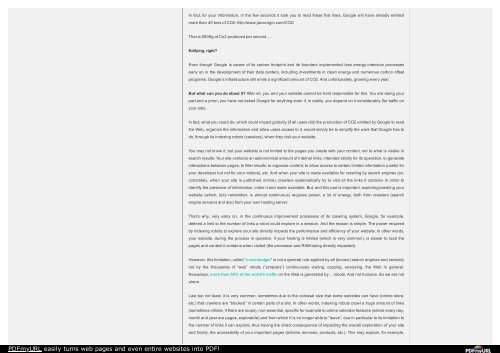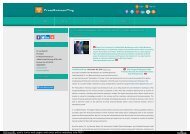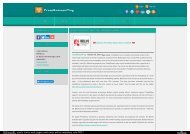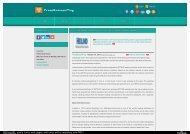Save the planet & reduce your ecological footprint with your website...
You also want an ePaper? Increase the reach of your titles
YUMPU automatically turns print PDFs into web optimized ePapers that Google loves.
PDFmyURL easily turns web pages and even entire <strong>website</strong>s into PDF!<br />
In fact, for <strong>your</strong> information, in <strong>the</strong> few seconds it took you to read <strong>the</strong>se first lines, Google will have already emitted<br />
more than 40 tons of CO2: http://www.janavirgin.com/CO2/<br />
That is 500Kg of Co2 produced per second….<br />
Edifying, right?<br />
Even though Google is aware of its carbon <strong>footprint</strong> and its founders implemented less energy-intensive processes<br />
early on in <strong>the</strong> development of <strong>the</strong>ir data centers, including investments in clean energy and numerous carbon offset<br />
programs, Google’s infrastructure still emits a significant amount of CO2. And unfortunately, growing every year.<br />
But what can you do about it? After all, you and <strong>your</strong> <strong>website</strong> cannot be held responsible for this. You are doing <strong>your</strong><br />
part and a priori, you have not asked Google for anything even if, in reality, you depend on it considerably (for traffic on<br />
<strong>your</strong> site).<br />
In fact, what you could do, which could impact globally (if all users did) <strong>the</strong> production of CO2 emitted by Google to read<br />
<strong>the</strong> Web, organize <strong>the</strong> information and allow users access to it, would simply be to simplify <strong>the</strong> work that Google has to<br />
do, through its indexing robots (crawlers), when <strong>the</strong>y visit <strong>your</strong> <strong>website</strong>.<br />
You may not know it, but <strong>your</strong> <strong>website</strong> is not limited to <strong>the</strong> pages you create <strong>with</strong> <strong>your</strong> content, nor to what is visible in<br />
search results. Your site contains an astronomical amount of internal links, intended strictly for its operation, to generate<br />
interactions between pages, to filter results, to organize content, to allow access to certain limited information (useful for<br />
<strong>your</strong> developer but not for <strong>your</strong> visitors), etc. And when <strong>your</strong> site is made available for crawling by search engines (so,<br />
concretely, when <strong>your</strong> site is published online), crawlers systematically try to visit all <strong>the</strong> links it contains in order to<br />
identify <strong>the</strong> presence of information, index it and make available. But, and this part is important, exploring/crawling <strong>your</strong><br />
<strong>website</strong> (which, let’s remember, is almost continuous) requires power, a lot of energy, both from crawlers (search<br />
engine servers) and also from <strong>your</strong> own hosting server.<br />
That’s why, very early on, in <strong>the</strong> continuous improvement processes of its crawling system, Google, for ex<strong>amp</strong>le,<br />
defined a limit to <strong>the</strong> number of links a robot could explore in a session. And <strong>the</strong> reason is simple. The power required<br />
by indexing robots to explore <strong>your</strong> site directly impacts <strong>the</strong> performance and efficiency of <strong>your</strong> <strong>website</strong>. In o<strong>the</strong>r words,<br />
<strong>your</strong> <strong>website</strong>, during <strong>the</strong> process in question, if <strong>your</strong> hosting is limited (which is very common), is slower to load <strong>the</strong><br />
pages and content it contains when visited (<strong>the</strong> processor and RAM being directly impacted).<br />
However, this limitation, called “crawl-budget” is not a general rule applied by all (known) search engines and certainly<br />
not by <strong>the</strong> thousands of “web” robots (“scrapers”) continuously visiting, copying, analyzing, <strong>the</strong> Web in general.<br />
Nowadays, more than 50% of <strong>the</strong> world’s traffic on <strong>the</strong> Web is generated by… robots. And not humans. So we are not<br />
alone.<br />
Last but not least, it is very common, sometimes due to <strong>the</strong> colossal size that some <strong>website</strong>s can have (online store,<br />
etc.) that crawlers are “blocked” in certain parts of a site. In o<strong>the</strong>r words, indexing robots crawl a huge amount of links<br />
(sometimes infinite, if <strong>the</strong>re are loops), non-essential, specific for ex<strong>amp</strong>le to online calendar features (where every day,<br />
month and year are pages, explorable) and from which it is no longer able to “leave”, due in particular to its limitation to<br />
<strong>the</strong> number of links it can explore, thus having <strong>the</strong> direct consequence of impacting <strong>the</strong> overall exploration of <strong>your</strong> site<br />
and finally, <strong>the</strong> accessibility of <strong>your</strong> important pages (articles, services, products, etc.). This may explain, for ex<strong>amp</strong>le,


















